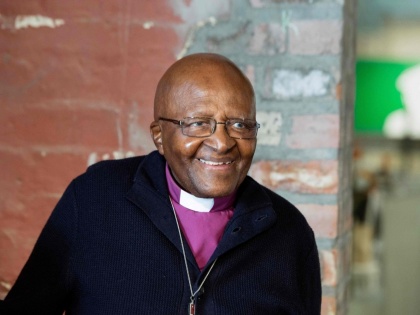South Africa’s first Black Anglican archbishop and noble prize winner Desmond Tutu dies
By Lokmat English Desk | Published: December 26, 2021 01:56 PM2021-12-26T13:56:12+5:302021-12-26T13:58:48+5:30
Archbishop Desmond Tutu, who won the Nobel Peace Prize for his opposition to racial discrimination in South Africa, has ...

South Africa’s first Black Anglican archbishop and noble prize winner Desmond Tutu dies
Archbishop Desmond Tutu, who won the Nobel Peace Prize for his opposition to racial discrimination in South Africa, has died. He was 90.Tutu died on Sunday in Cape Town, President Cyril Ramaphosa’s office said in a statement. He was diagnosed with prostate cancer in 1997 and underwent surgery. Tutu was subsequently hospitalized several times to undergo treatment for infections and other ailments. As South Africa’s first Black Anglican archbishop, Tutu used his international profile to lobby for sanctions against the White-minority government. From 1996 to 1998, he led the Truth and Reconciliation Commission, aimed at exposing the injustices of the past.
Born on Oct. 7, 1931, in Klerksdorp, west of Johannesburg, Tutu worked as a teacher before entering a theological seminary. He was ordained as an Anglican priest in 1961, obtained a master’s degree in theology at King’s College, University of London, and in 1975 was appointed Dean of Johannesburg, the first Black person to hold the post.With many of South Africa’s Black leaders in jail, including Nelson Mandela, and others in exile, Tutu emerged as a leading voice of Black defiance against apartheid.He became general secretary of the South African Council of Churches, an organization at the forefront of the struggle against White-minority rule, in 1978. He called for economic sanctions against the apartheid regime, in defiance of a law that made it illegal to advocate such actions. The government responded by withdrawing his passport. In 1984, the Nobel Committee awarded Tutu its annual Peace Prize, citing his “role as a unifying leader figure in the campaign to resolve the problem of apartheid in South Africa. ”Tutu officially retired from public life in 2010, yet continued to do charity work through his Desmond and Leah Tutu Legacy Foundation.